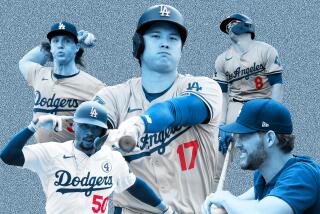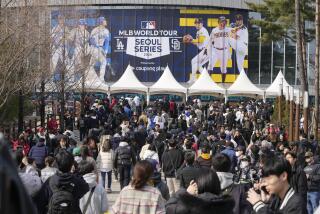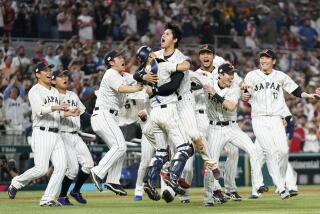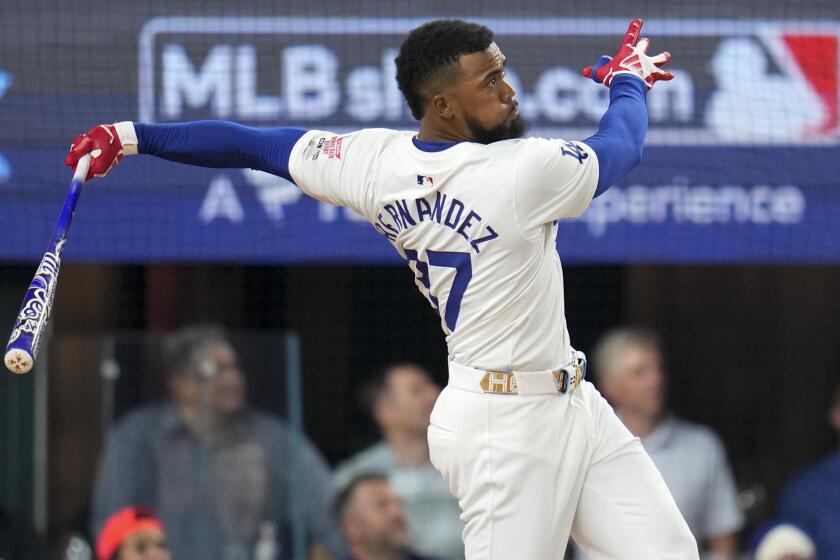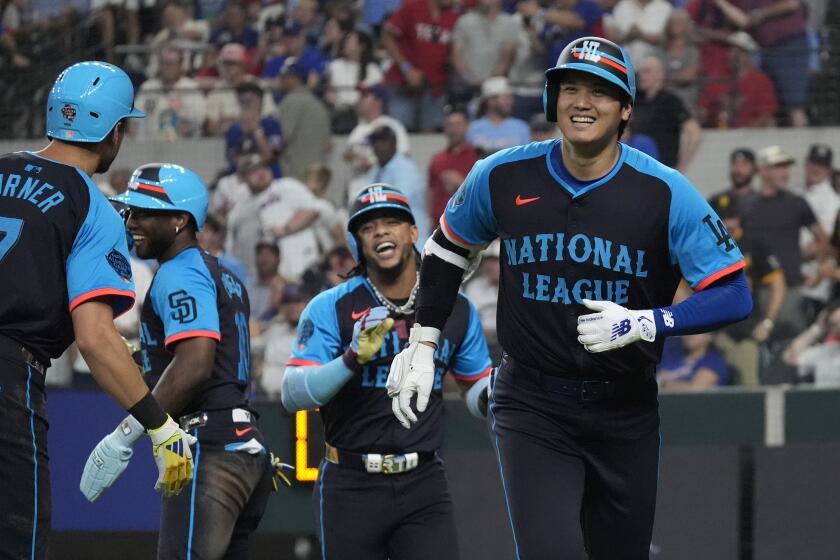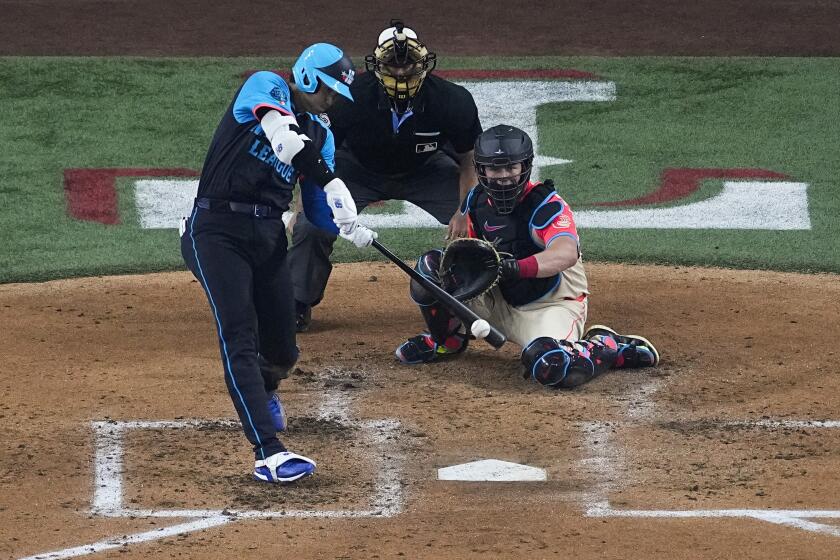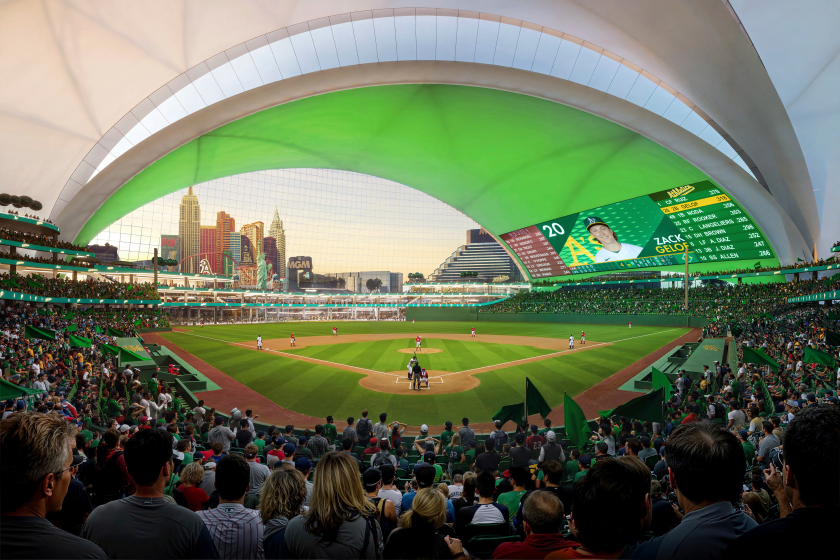This Dodgers Gold Glover never lost his Midas touch
If you were one of the lucky kids befriended by Wes Parker in the early 1970s, when the Dodgers first baseman regularly hit fly balls to youngsters in the Dodger Stadium parking lot after Sunday home games, you probably won’t be surprised to learn that Parker these days is a volunteer at the Braille Institute.
And if you are one of the sightless men and women who sometimes stand and applaud at the end of Parker’s weekly sports class at Braille, you’re probably not surprised to learn that, even back then, he was generous with his time.
Or, as class regular Alfredo Crispo puts it, “Wes Parker is awesome.”
Not at all, Parker says.
The 67-year-old former ballplayer and television actor -- fans of “The Brady Bunch” may remember him from an episode in which he played the fiance of Greg Brady’s math teacher -- says he takes from these interactions as much as he gives.
That’s why, when reporters back in the day asked about his Sunday afternoon routine, he pleaded with them not to write about it, lest it become overrun.
He didn’t want it to end.
“I would look forward to those games with the kids more than the games against the other National League clubs because they were more personal, more intimate,” says Parker, who retired in 1972 after nine major league seasons and, though best remembered as a six-time Gold Glove winner, is the only Dodger to hit for the cycle in the last 58 years.
Afterward, Parker would pile as many of the kids into his car as he could, treat them to sodas and ice cream and, in some cases, drive them home to their parents.
One of them was Reuel Herron, who is now a 49-year-old bank manager and father of two living in Victorville. “It’s one of those memories I wish every kid could have,” says Herron, who has stayed in contact with Parker. “Some of today’s athletes need to know what a positive impact they can have on kids.”
And vice versa.
Says Parker: “One of the things I always missed about getting ovations on the field was that, as nice as that was and as good as it felt, when it was all over and you’d get into your car and drive home, you were alone again and you’d never met anybody. Greeting those kids after games always meant more to me than the ovations from a bunch of people I never met. The greater enjoyment comes from meeting people face to face and talking to them and making a connection.”
That’s what led him back to the Braille Institute six years ago. Toward the end of his playing career, Parker says he spent several weeks at the facility on Vermont Avenue reading to a group of blind men and women at the request of Rube Samuelson, a Pasadena Star News reporter who had lost his sight.
Virtually a lifelong bachelor -- though married during his playing days, he says the union was annulled after less than a week, “kind of like a Britney Spears thing” -- Parker says that a few years ago he found himself with extra time on his hands and approached administrators at the Braille Institute about starting a class.
“They really appreciate what I have to give them, and there’s nothing like being appreciated,” Parker says of the group of about 20 regulars, who are also treated to an annual Dodgers game. “There have been classes where, when I’m finished, they start clapping. That’s a compliment that’s hard to beat. I always walk out of that classroom feeling better than when I walked in -- always.”
It sure beats the reception he used to get from other groups.
“When I first started speaking for the Dodgers,” Parker says, laughing, “a lot of the kids didn’t remember me. But all I had to do was say, ‘You probably saw me on “The Brady Bunch” ’ and they all knew me. It just astounded me, the power of television, because I was on the screen for maybe 15 seconds and more kids knew about that than knew I had played with the Dodgers for nine years.”
Parker was an actor for about 15 years and worked often enough that he draws a Screen Actors Guild pension, but he is dismissive of his abilities.
“It wasn’t suited to my personality,” he says of acting. “I’m not outgoing, and I found that it wasn’t comfortable for me.”
A lifelong L.A. resident who has lived in Pacific Palisades for the last 35 years, Parker was more at home in the ballpark, helping the Dodgers win the World Series in 1965, compiling a .267 lifetime batting average and earning distinction as one of the best fielding first basemen in major league history. He is one of six first basemen and the only Dodger on the ballot for the all-time Rawlings Gold Glove team, which is open to fan voting through June 19 at
rawlingsgoldglove.com.
For Parker, who says that “fielding has always been underrated, especially in the Hall of Fame,” just making the ballot was a tremendous honor.
And treating people right, he believes, is a reward unto itself.
“I bet I got more fun out of hitting to those kids than those kids got playing with me,” he insists, fondly recalling his parking-lot playtime outside the Stadium Club. “It wasn’t like I was doing something completely unselfish.
“I was getting a lot out of that. And that’s basically why I did it -- not to be a great guy. I could see how much it meant to them, and that made me feel good.”
With good reason.
More to Read
Are you a true-blue fan?
Get our Dodgers Dugout newsletter for insights, news and much more.
You may occasionally receive promotional content from the Los Angeles Times.
